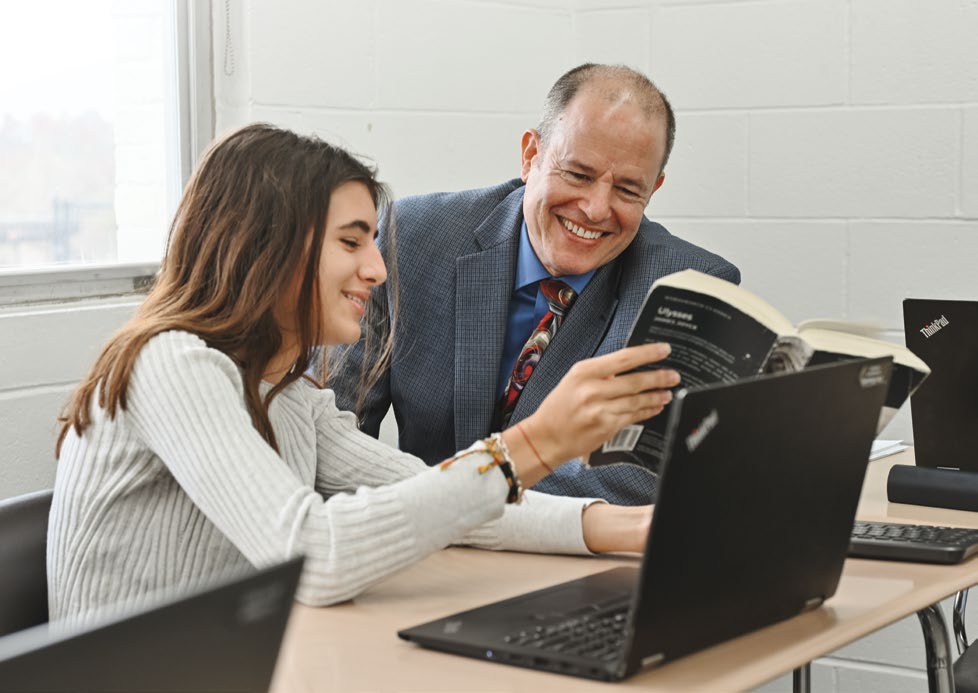
By Tim Donahue, Upper School English Teacher
Dr. Gregory Grene is a proponent of slow food. If you took his popular Intersession class on Gastronomy, you would learn that, against the avalanche of highly processed schlock, there’s an enduring value to traditionally prepared, local foods. So, you might have been on the receiving end of one of his enthusiastic “Try it!” overtures for dim sum, or Madeleines, or boeuf en daube, and learned to enjoy a new taste.
The son of David Grene, one of the foremost translators of Greek classics and a long-time professor at the University of Chicago, he was raised with very much a “slow foods” approach to literature. “We are all ancient Greeks,” he says. “They thought things no one else was thinking in the world.”
Dr. Grene studied classical literature at Trinity College in Dublin; he studied Shakespeare and worked as a Broadway actor; and a few years ago, at Columbia University, he published his doctoral dissertation on the primacy of Foundational Texts. “I am passionate about literature that has had enough time to find its place in our consciousness, that has framed the ways we think, that has changed the world,” he says.
Last spring, coming into his third year at GCDS, Dr. Grene translated this conviction into his year-long Iconic Novels elective. It began with the relatively straightforward Great Expectations, by Charles Dickens, examining how memory affects narrative. Toward late October, students plunged into the 860-page Anna Karenina, where Leo Tolstoy’s narrative technique of free indirect discourse acts “like a camera that characters swallow and that goes through the whole body.” And, as Tolstoy’s narrative moves from the conscience “of the main character, to a dog, to the coachman, there is a fog that creeps from one character to another.”
The second semester began with Albert Camus’ The Stranger, and an examination of its famously unreliable narrator, who begins with the confession “Maman died today. Or yesterday maybe, I don’t know.” But all of this coursework, built through Socratic Seminar-style discussions among the twelve seniors and four juniors, served as a training ground for its ambitious climax: James Joyce’s Ulysses, which traces a single day—June 16, 1904—through the lives of several characters in Dublin, over a sprawling 750 pages.
While Dr. Grene can readily cite the literary heavyweights who have shaped his readings, like Louise Rosenblatt and Harold Bloom, or clarify the quiddities of Joyce, like the status conferred to those Dubliners who drank Apollinaris water, he believes firmly that “the classroom is a democracy.” He says, “I’ll start the toboggan going down the hill, and then I’ll deliberately sit out and have students take the lead.”
During my most recent visit to Iconic Novels, students were comparing the “Cyclops” chapter of Ulysses with the short story “Counterparts,” from Joyce’s Dubliners collection. The class began, as it often does, with “turn to your neighbor” conversations: students were reading their short comparison essays as he went ’round and noted vignettes he would solicit them to share through the 55-minute episode. I’ve been Dr. Grene’s colleague for the past decade—priorly at Fieldston—and I’ve never seen him fill more than 15 percent of the airtime with his own words. “He lets you run the class,” says Ella Davis ’24. “Everyone is bouncing off each other’s ideas.” Sol Hochman ’24 also appreciates the reliably student-centered classroom: “There is no in-class activity, no lecture, just an open floor to discuss the book.”
Anyone who disparages high school kids and their addiction to Tik Tok would behold another land here, where there are no screens, but only pen and paper. On that rainy afternoon, students spoke of how masculinity is a byproduct of Irish nationalism, how nationalist ideas complicate individual identity, of the similarities between characters’ alcoholism and their religiosity, of the “othering” of the main character who, Felix Hentsch-Cowles ’24 wrote, “struggles to stifle his feeble nature.” They spoke of the flawed elixir of escape fantasies, they compared Joyce’s style of free indirect discourse to Tolstoy’s, they discussed the limits of sympathy, and Joyce’s invitations to empathy.
From behind the dais, where he stood chin on hand, Dr. Grene would sometimes wave his maestro’s wand to say things like, “I completely take your point. It’s a beautiful point. But let me ask you a question. . . .” On one occasion, he cold called a student, to gently prompt, “Tell me something that popped for you.”
She was ready. Every student was ready. Everyone had heavily-annotated books, citing passages that ranged from pages 301 to 552. Comments were lengthy and responsive; students called on each other. Someone cited the Marx she’d learned in history class; another cited the method of denotation she’d learned in Creative Writing. Penelope Hentsch-Cowles ’25 captures this widening gyre well: “One of my favorite things about the class is it allows me to expand beyond my immediate reality. Books are our collective attempt to understand our human condition better.” Ellie Stark ’24 agrees: “These texts teach empathy: You can put yourself into the shoes of the other.” Ella put it quite simply, “This class taught me why people are so fascinating.”
Dr. Grene coaches soccer and wrestling; he’s also a bona fide rock star—for over two decades he’s been the front man for the prolifically-gigging Irish band The Prodigals. (He also started a school in Haiti—just Wikipedia him!) Still, he finds his Grecian urn in the hum and promise of a classroom, where he is called to “embrace the excitement of thought and imagination” and where he truly believes “the way we understand the world is through narrative.”
Dr. Grene is impelled to “invert the common zeitgeist” in his classroom. “With everything getting fractured, everything broken and splintered,” he says, “reading a 680-page novel and maintaining the belief of thought—this is subversive and iconoclastic and important.” If he is spawning a teen rebellion through the deconstruction of text, it’s hard to think of anything more nourishing.
#gcdsus











.JPG&command_2=resize&height_2=85)





.jpg&command_2=resize&height_2=85)




